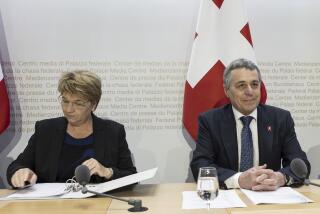West Should Push on Chechnya
- Share via
President Clinton and Western leaders will sit down today and Friday in Istanbul, Turkey, with their counterparts from the former Communist bloc countries. They should use the occasion to continue to confront Russia over its brutal war in Chechnya and to remind the former Soviet republics that rigged elections do not qualify them as democracies. The Organization for Security and Cooperation in Europe (OSCE), which is sponsoring the Istanbul summit, should urge Russia toward a negotiated solution to the Chechnya conflict and offer to act as the mediator in such talks.
Moscow is losing more than its reputation by waging the war in the northern Caucasus region. Safety concerns raised by the war are the main reason why the United States, Turkey and two Caspian Basin nations decided, in a deal to be signed today, to build an oil pipeline westward to the Mediterranean rather than through the Caucasus.
The OSCE, launched in 1973, earned a reputation as a fighter for human rights in the Communist bloc countries. Since the collapse of communism a decade ago, the 54-nation OSCE has become the sponsor of several European security measures, including the Conventional Armed Forces in Europe Treaty and the Budapest code of conduct for governments involved in internal and external conflicts. The OSCE does not have an army of its own to enforce the treaty or the code, but it does carry diplomatic weight among its members, especially in Russia. Moscow likes and trusts the OSCE, and hopes it, rather than NATO, will one day be the forum for European security issues.
Using that hope as a lever, the OSCE leaders should insist that Moscow seek a diplomatic solution in the Chechnya conflict, with the OSCE helping to broker a peace agreement. In exchange, Western governments, including the United States, should promise to broaden cooperation with Moscow in combating terrorism in Russia.
Western governments should also use the OSCE summit to condemn the recent presidential election in Ukraine, which returned the corrupt President Leonid D. Kuchma to office in what Western observers said was unfair balloting. Criticism by the OSCE helped expose major irregularities in last month’s parliamentary election in Kazakhstan. Similarly, the OSCE should blast President Alexander G. Lukashenko’s dictatorial regime in Belarus and send experts to Minsk, under a tradition of monitoring elections and crises in member nations, to investigate the recent disappearances of political opponents.
This would be a full and difficult docket. But as the OSCE says, internal conflicts that lead to human rights concerns are no longer only the internal affairs of member states.
More to Read
Sign up for Essential California
The most important California stories and recommendations in your inbox every morning.
You may occasionally receive promotional content from the Los Angeles Times.













